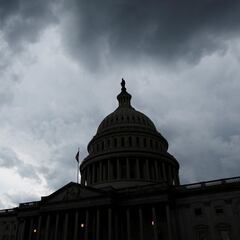2022 Midterm Elections: Be careful with misinformation, conspiracy theories and fake news on Twitter
Disproven claims of voter fraud have spread since the 2020 election and hundreds of ‘Big Lie’ supporters are set to win their races this November.


With a week remaining until Election Day 2022, more than 21 million people have already cast their votes by early ballot. At current rate this year’s turnout is on track to surpass that of 2018′s midterms, when the divisive presidency of former President Trump brought about a record number of midterm votes.
Commentators have described the 8 November elections as some of the most consequential in recent decades, due in part by a single strand that connections hundreds of candidates across the country.
Michael Berkman, a Penn State professor and director of the McCourtney Institute for Democracy, outlined the core belief that has taken hold within elements of the Republican Party and its supporters:
“Coming down from elites – from the former president, from leaders within the Republican Party, from many candidates – is the perpetuation of this idea that something was stolen, that these elections are not legitimate.”
Baseless claims of election fraud had been circulating even before the 2020 presidential election and, despite being consistently dismissed in courts across the country, have only spread in the two years that followed. Trump and his acolytes have continued to peddle the conspiracy theories and Americans now face a vital choice in the upcoming midterms.
Social media poses a threat to election integrity
In the aftermath of the 2020 presidential election platforms like Twitter, Facebook, YouTube and TikTok all claimed to have bolstered efforts to tackle election misinformation. Trump’s online rhetoric and the speed with which it spread was blamed for the violence at the Capitol on 6 January 2021.
But mentions of “stolen election” and “voter fraud” remain widespread and usage has soared in recent months. In fact, a report from PBS found that they are two of the three most commonly-used terms in relation to the 2022 midterms.
For social media users it can be extremely difficult to spot something fake online. A study in the Proceedings of the National Academy of Sciences found that three-quarters of American overestimate their ability to identify misinformation.
The study, which surveyed 8,200 people, found that the more confident a user was of their ability to spot a false headline, the more likely they were to be misled.
When in doubt, established sources are far more likely to give correct information and users should read the whole article to avoid being tricked by a misleading headline. For any specific queries you may have, fact-checking websites like FactCheck.org, Washington Post Factchecker, PolitiFact or Snopes can provide a balanced assessment of the claims being made.
Election deniers on track to win seats this November
As is often the case in the midterms, the party in power looks set to face a backlash from the electoral. It is part of the cycle of politics in the United States, quickened by the economic pressures felt in households across the country, and it will likely see the Republicans flip at least one of the Houses of Congress.
But while this pendulum of political power is nothing new, the next swing could bring a seismic shift in American elections.
Election analysts at FiveThirtyEight count at least 185 Republican candidates running for House, Senate and governor’s seats who have publicly claimed that the 2020 election was ‘stolen’ from Trump. Of that number, 124 candidates - or 67% - are projected to have at least a 95% chance of winning election.
60% of voters will have an election denier on their ballot in the midterms.
— Rep. Pramila Jayapal (@RepJayapal) November 1, 2022
The Big Lie led to the violence of the insurrection, the increasing violence that lawmakers are seeing at our doorsteps, and is a direct threat to our democracy.https://t.co/uCvQ9guoyS pic.twitter.com/57X314Bgkl
There will likely be a raft of election deniers entering Congress and governors’ offices across the country, posing a fundamental threat to election integrity in the United States.
The same is true further down the ballot, where election deniers look set to pick up a raft of seats in state legislatures. CNBC found that 58% of the Republican nominees in five key battleground states - Nevada, Pennsylvania, Arizona, Michigan and Minnesota – have mimicked Trump’s claim that the 2020 election was stolen from him.
Experts warn that GOP majorities in state houses across the country could affect future races. As Trump tried to persuade them to in 2020, local officials could attempt to ignore the democratic vote and to send a slate of alternative electors.
Related stories
This poses a very real threat to upcoming elections and to democracy more broadly in the US. Berkman warns that developed democracies can become complacent about threats to the process, but that belief is misguided.
“We’re all watching what’s happening in Ukraine and impressed and proud of the Ukrainians, how they’re standing up and fighting for their democracy,” he said. “But democracy doesn’t usually die through coups or invasion. It usually dies from within.”

